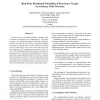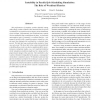874 search results - page 41 / 175 » On Advantages of Grid Computing for Parallel Job Scheduling |
JSSPP
2009
Springer
14 years 2 months ago
2009
Springer
Abstract. As multi-core processors proliferate, it has become more important than ever to ensure efficient execution of parallel jobs on multiprocessor systems. In this paper, we s...
JSSPP
2009
Springer
14 years 2 months ago
2009
Springer
In this paper, we examine the concept of giving every job a trial run before committing it to run until completion. Trial runs allow immediate job failures to be detected shortly a...
CCGRID
2008
IEEE
14 years 2 months ago
2008
IEEE
— Data grids and its cost effective nature has taken on a new level of interest in recent years; amalgamation of different providers results in increased capacity as well as lowe...
IPPS
2007
IEEE
14 years 2 months ago
2007
IEEE
Previous work on scheduling dynamic competitive jobs is focused on multiprocessors configurations. This paper presents a new distributed dynamic scheduling scheme for sporadic re...
IPPS
2006
IEEE
14 years 1 months ago
2006
IEEE
The performance of computer systems depends, among other things, on the workload. This motivates the use of real workloads (as recorded in activity logs) to drive simulations of n...


